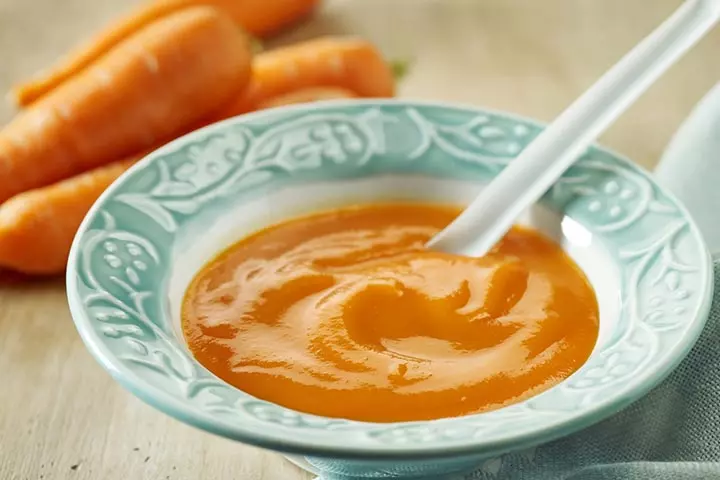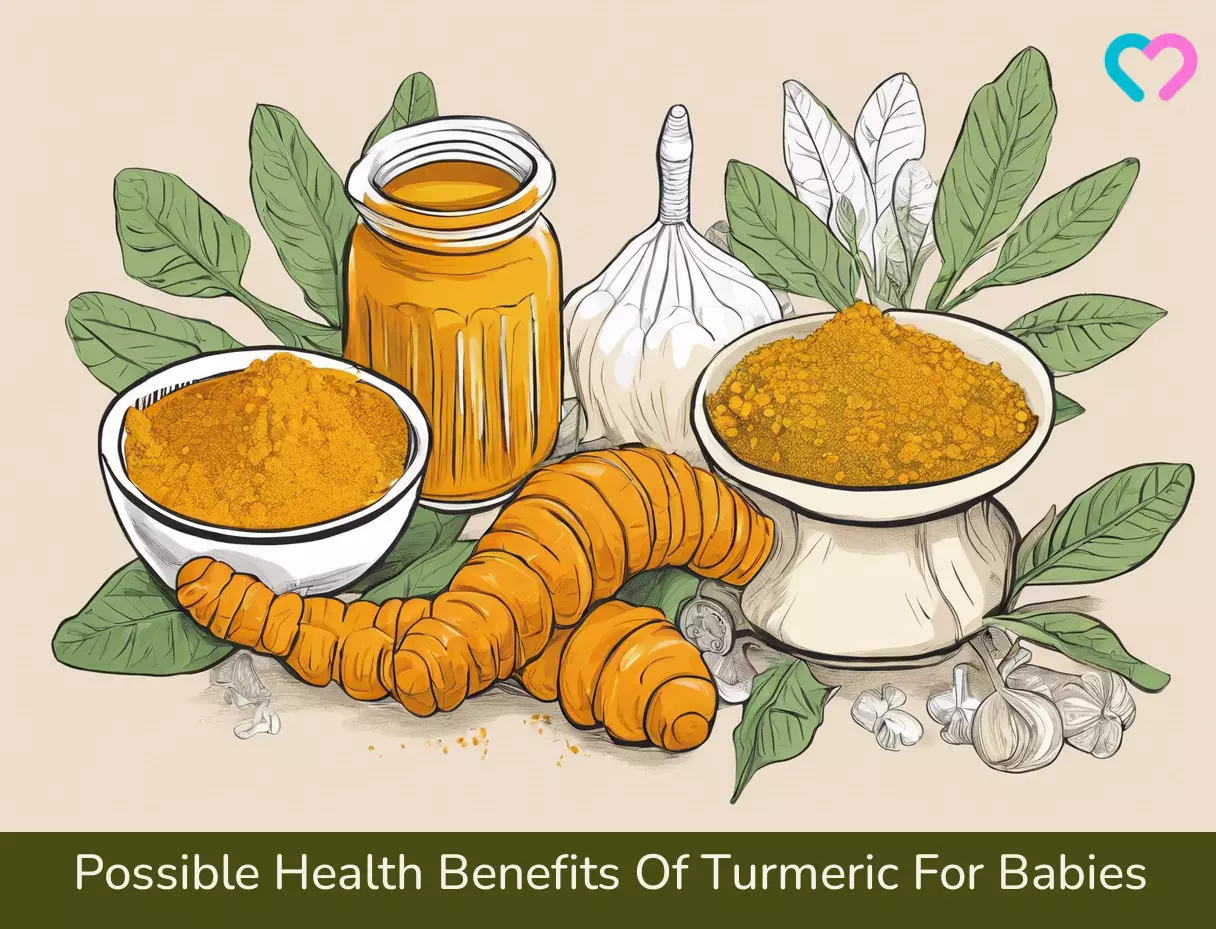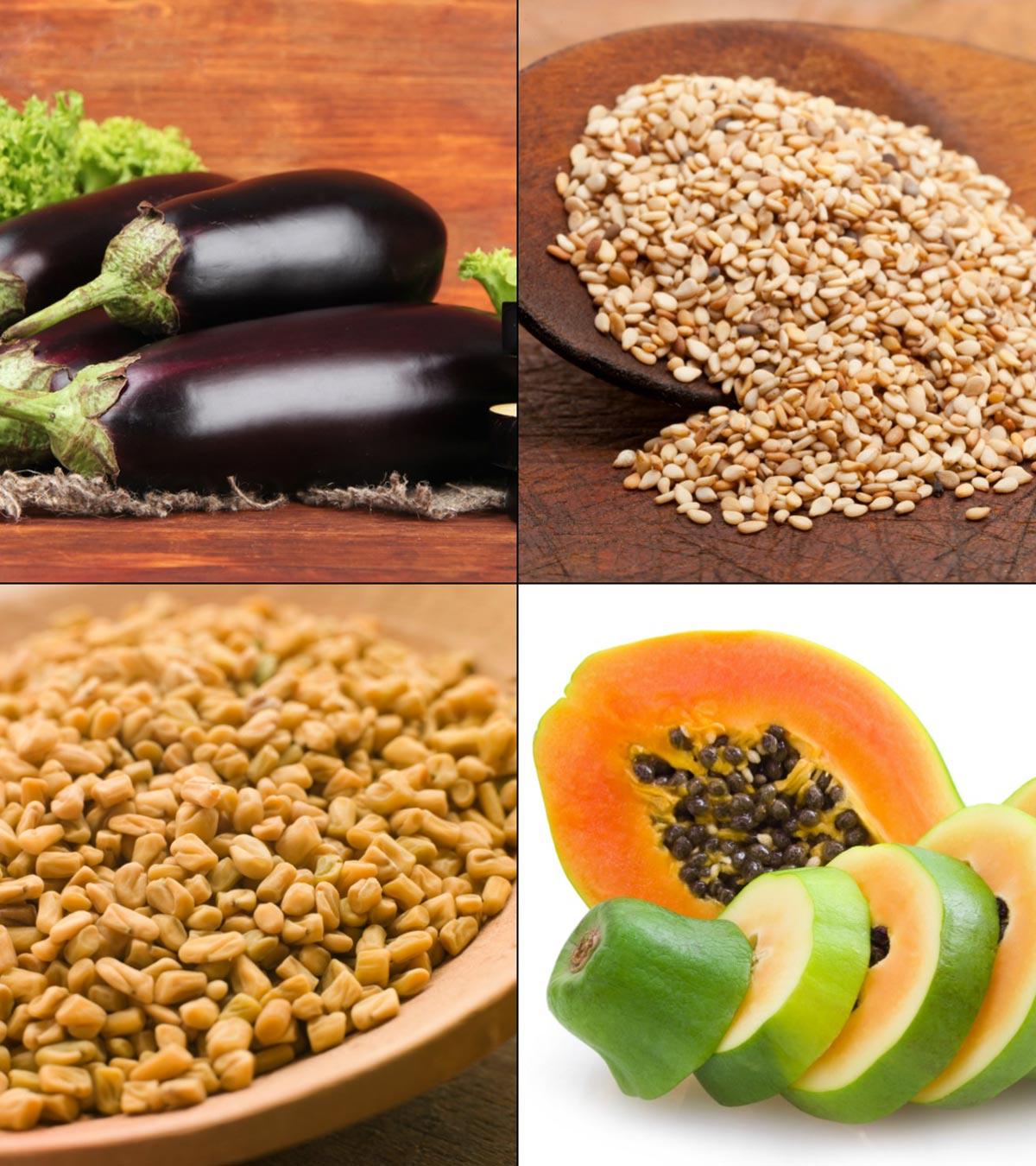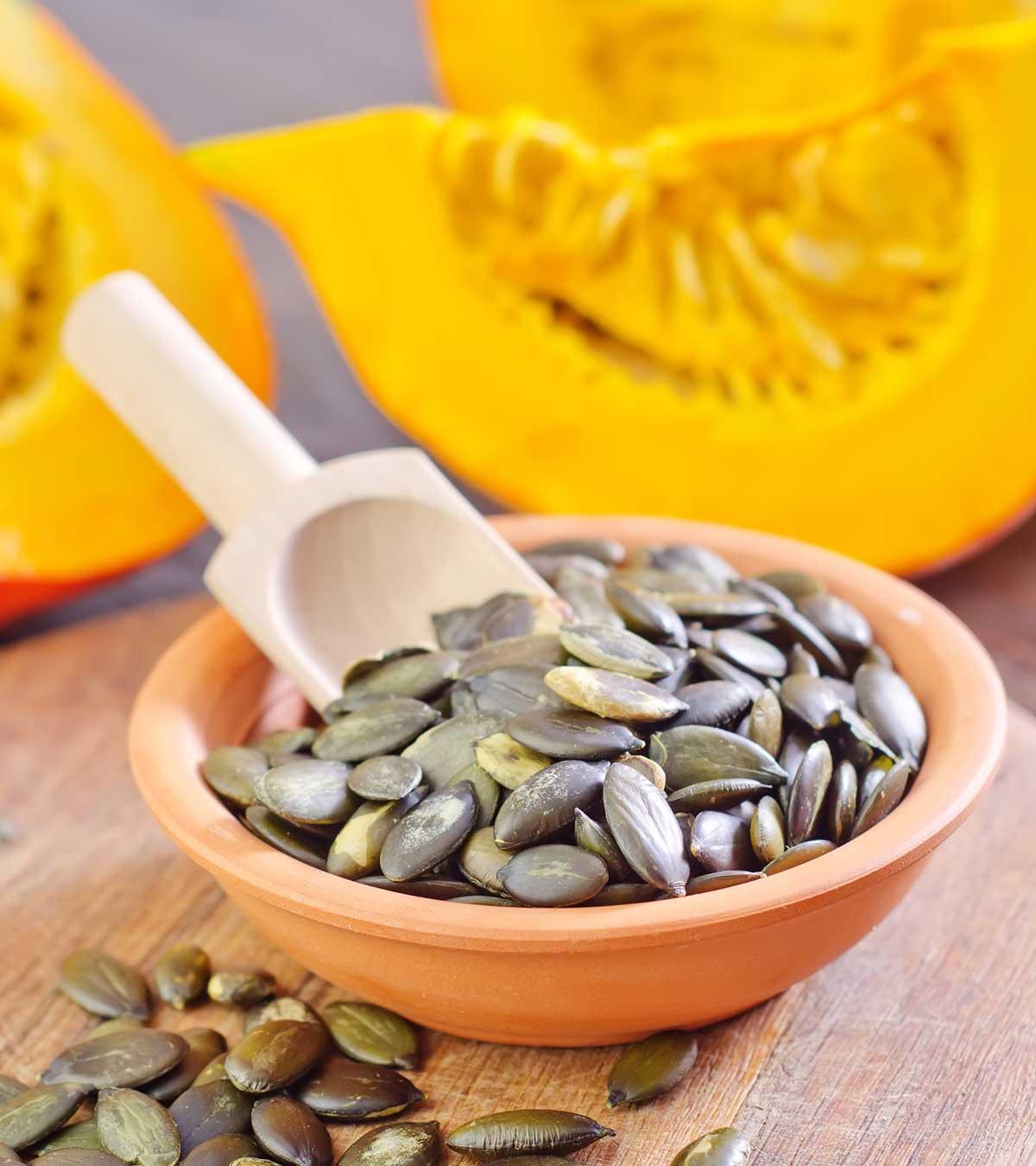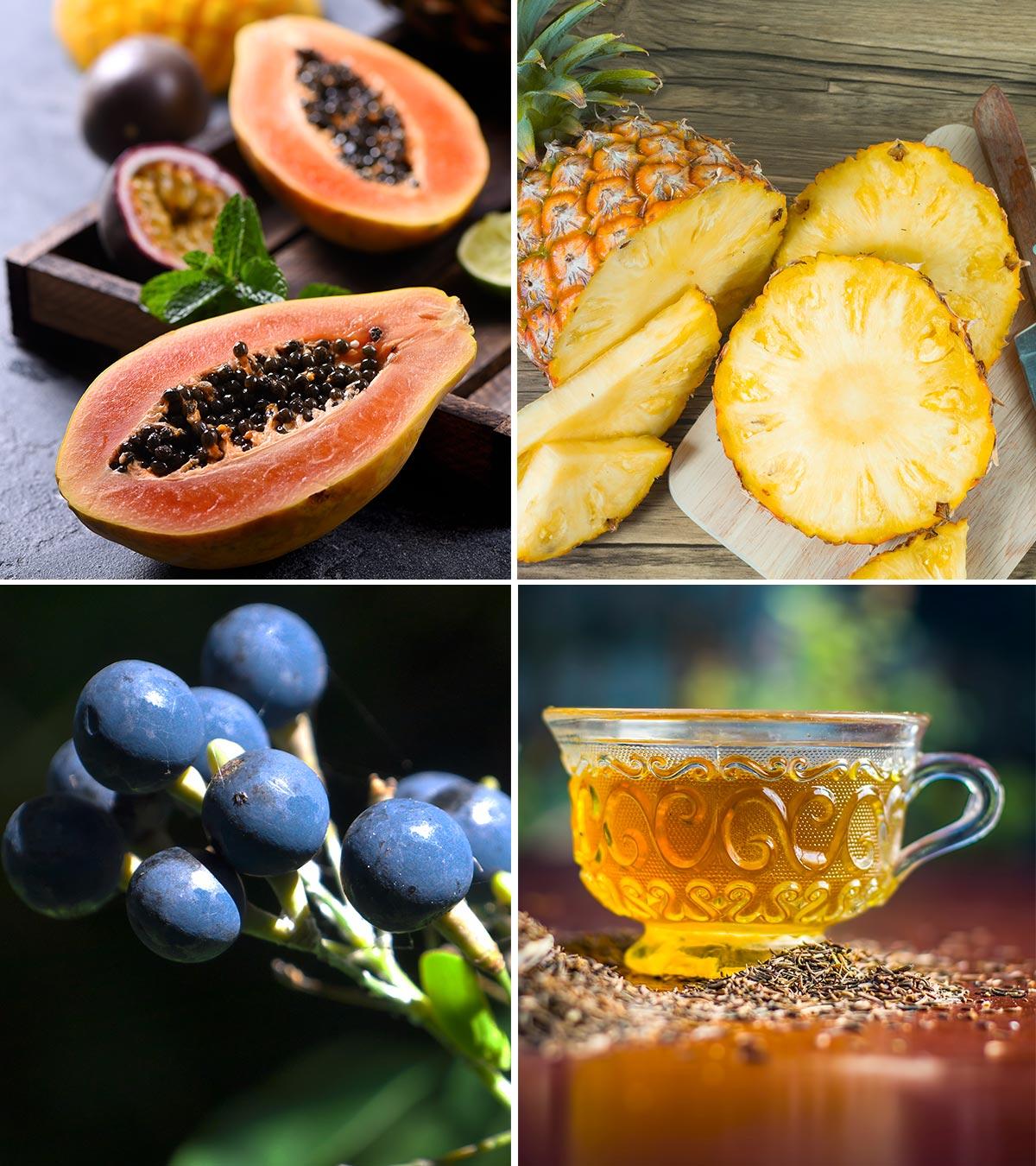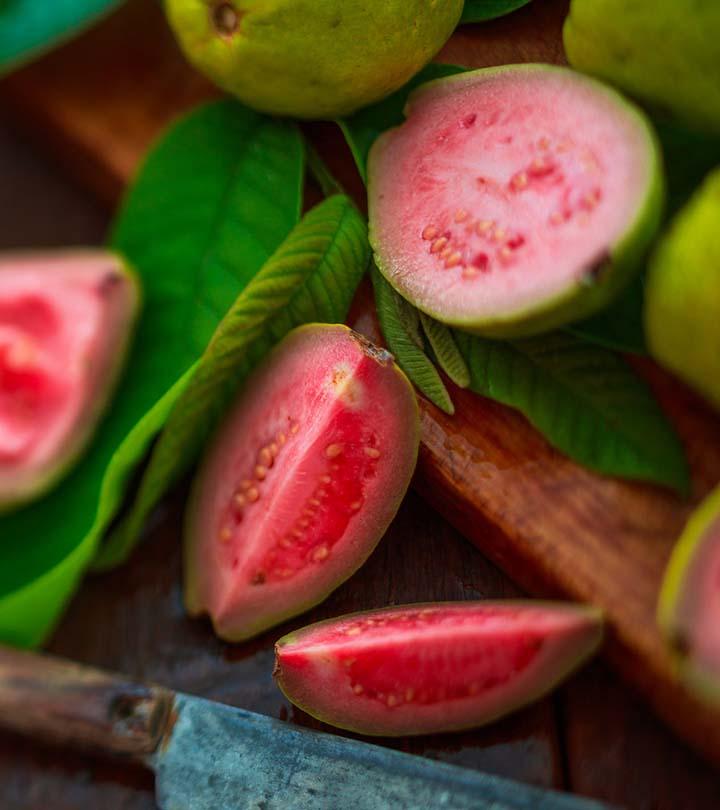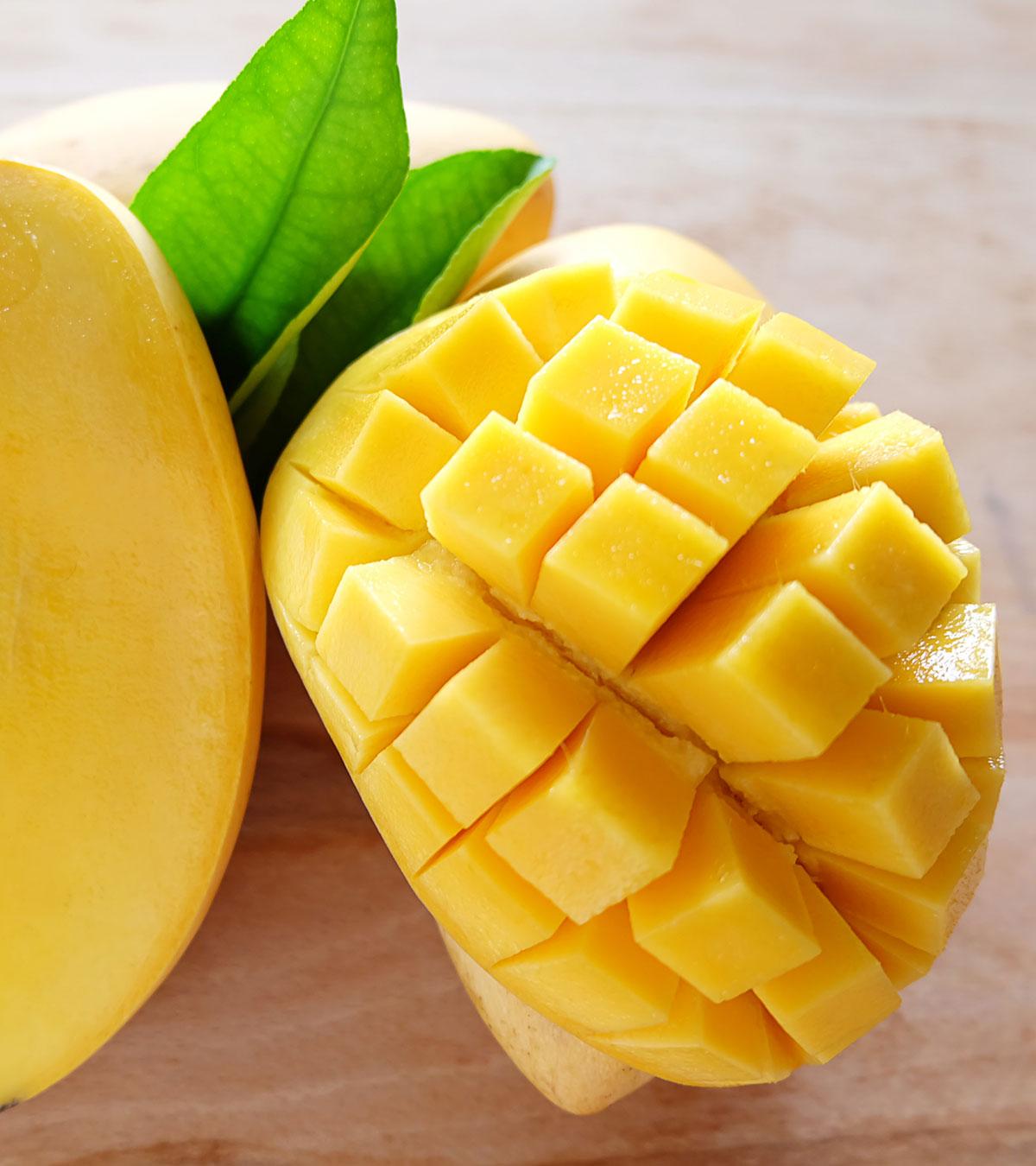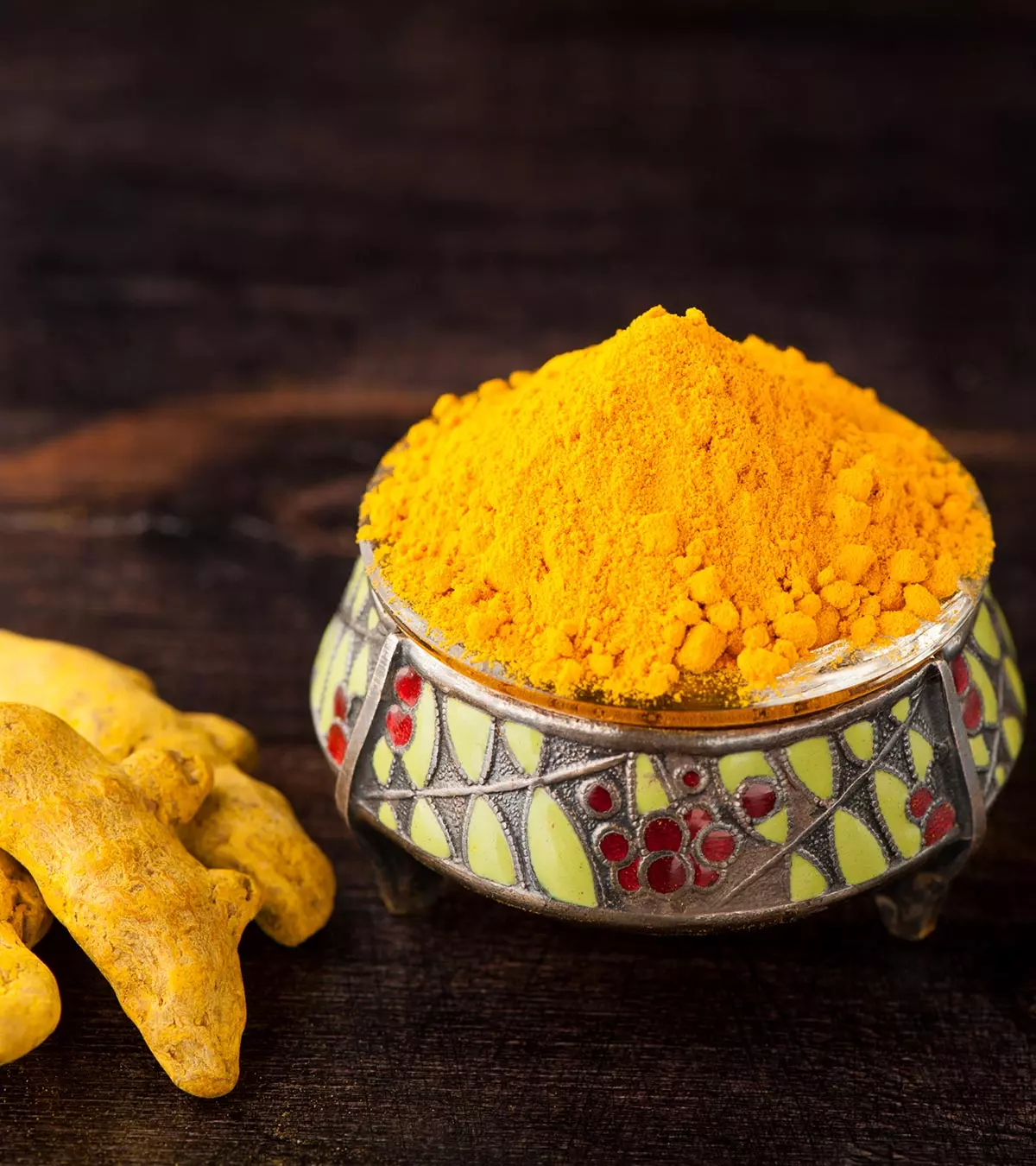
Turmeric (Curcuma longa) is a spice belonging to the ginger family. Although the use of turmeric for babies isn’t well-researched, it is commonly used for dietary and medicinal purposes in Asia. For instance, many cultures use turmeric as an antibiotic to heal wounds.
If you wish to include this wonder spice in your baby’s diet, knowing when to introduce it is essential. Keep reading as we tell you about the safety of turmeric for babies, its possible health benefits and side effects, and precautions to take when feeding turmeric to babies.
Can Babies Have Turmeric?
Yes, babies can have turmeric. The US Food and Drug Administration considers turmeric as ‘generally recognized as safe’ for use in food (1). However, there are no clear clinical indications about the safety of turmeric in infants. If you are unsure about the safety, you may consult an infant nutrition specialist before introducing turmeric to a baby.
Avoid feeding turmeric to newborn babies or babies under six months, who are solely dependent on breast milk for their nutritional needs.
 Did You Know?
Did You Know?When To Introduce Turmeric To Babies?
Image: Shutterstock
Turmeric, as a spice, can be introduced to babies as soon as they start eating solids, which is around the age of six months. You may add small amounts of turmeric in vegetable purees, soups, dals (lentils), and vegetable cereals.
However, if your baby is on medications, talk to a pediatrician because turmeric can have possible drug interactions (2).
Health Benefits Of Turmeric For Infants
Image: Shutterstock
Turmeric does not have any specific nutrients that could enhance the nutritional value of the food via nutrient absorption. However, it has certain bioactive compounds such as curcumin and curcuminoids that can be beneficial for the overall infant health.
- Gastrointestinal diseases: Regular consumption of turmeric is known to support digestion and gastrointestinal health by stimulating bile acid production (3). It is also considered to treat and manage gastric issues such as dyspepsiaiUpper abdominal discomfort or pain associated with indigestion , loss of appetite, intestinal gas, and irritable bowel syndrome (IBS) (4) (5). However, it requires deeper research to validate these uses.
- Cardiovascular health: Owing to the antioxidantiMan-made or natural substances that may prevent or slow down cell damage caused due to harmful molecules called free radicals , anti-inflammatory, and anti-thromboticiProperty of a food or drug to prevent the formation of blood clots properties of curcumin, the use of turmeric is promoted for heart health (6). Recent research shows that regular consumption of turmeric, in the long run, is associated with a decrease in total cholesterol, LDL, and triglycerides (7). However, it is not known if these qualities could benefit a baby.
- Immunity: In some cultures, turmeric is seen as one of the best immune-boosting foods. Curcumin is known to modulate the immune response by modulating the activation of macrophagesiSpecialised immune cells that can detect and destroy bacteria and other disease-causing organisms , neutrophilsiA type of white blood cell that helps fight bacteria, viruses, fungi, and inflammation , natural killer cells, etc. (8). You may add small amounts of turmeric in food.
- Pain management: Oral and topical use of turmeric is associated with effective pain management. In complementary medicine, it is used to manage arthritisi An autoimmune disease causing inflammation and pain in one or more joints and osteoarthritisi The most common type of arthritis, also identified as a degenerative joint disease (DJD) pain (9). Curcumin is the yellow-colored bioactive compound of turmeric that gives the spice natural pain killer properties.
- Skincare: Early evidence from several clinical studies suggests that oral and topical use of turmeric may improve skin health (10) (11). However, more intensive research trials are needed to validate the suggestion.
- Cough: In Ayurveda, Unani, and Chinese medicines, turmeric is considered to expel phlegm and provide relief from cough and cold (12). Several clinical studies support this use due to the anti-inflammatory properties of curcumin that help provide relief from respiratory issues and thereby promote respiratory health (13).
- Overall health: Curcumin from the turmeric root possesses strong antioxidant and anti-inflammatory properties (14). Besides, turmeric also possesses antiviral and antibacterial properties that could help fight infections. The antimicrobial activity of turmeric is attributed to the presence of curcumins, curcuminoids, turmeric essential oil, and other bioactive compounds such as turmerol and valeric acid (15).
- Herbal home remedies: If your pediatrician allows, you may use turmeric for herbal and natural remedies, such as:
Image: Shutterstock
- Topical application of turmeric paste over a small cut or wound. You may also add sandalwood paste along with turmeric paste.
- Oral use of turmeric in the form of turmeric (haldi) milk. This is a household recipe and a traditional medicine used for treating wounds and infections in India.
- Turmeric is also used for providing relief from colic and is widely known to aid in fever reduction.
Possible Side-effects Of Turmeric For Babies
Turmeric generally is well-tolerated and is considered safe. However, when consumed in large amounts, it could cause gastric issues such as an upset stomach or diarrhea. Thus, contrary to the popular belief, turmeric does not act as a diarrhea relief medicine. Besides, it has some other possible side-effects.
- Iron absorption: Turmeric could inhibit the body’s iron absorption by 20-90%, thus increasing the risk of iron deficiency anemia (16). Turmeric consumption should be carefully regulated in babies with anemia or chronic low iron reserves in the body.
- Possible drug interaction: If your baby is on any medication, then consult a pediatrician before introducing turmeric in your infant’s diet. This is crucial as turmeric is known to have drug interactions, such as with diabetes medicines, blood thinners, and medicines used for regulating stomach acid production (17).
- Allergy: According to the CDC’s National Health Interview Survey 2021, the prevalence of food allergies in children aged zero to five years is 4.4%. Although turmeric is not a common allergen, it can cause an allergic reaction (18). Generally, spices like turmeric can have non-allergic or allergic reactions in sensitive individuals (19) (20). If your baby shows signs of allergy or sensitivity, avoid using turmeric or any product containing turmeric.
Precautions To Take While Using Turmeric For Babies And Toddlers
Take the following measures while using turmeric for your baby.
- Use organic turmeric powder from a trusted brand.
- If possible, go for homemade powder. However, ensure proper hygiene while preparing the powder at home.
- Use turmeric only in a small amount. Avoid using any dietary supplements made of turmeric/curcumin for babies. Turmeric in excess may lead to hepatotoxicityiChemical or food-driven liver damage , which is a condition that causes damage to the liver (21).
- If your infant is allergic or sensitive to turmeric, then check the labels of the food purchased. Avoid buying products that contain turmeric or curcumin in any form.
 Caution
CautionWays To Include Turmeric In Your Infant’s Diet
Image: IStock
Once solids are started, healthy babies can consume turmeric through various homemade baby food recipes. However, use no more than a pinch at a time.
- Turmeric powder can be added to vegetable purees and various soup preparations. Later, as your child starts taking mixed grains and cereal products like khichdi and dals, turmeric can be added to each of these as a spice.
- If you have started cow’s milk for your toddler older than a year, then you may consider preparing turmeric milk for them. Prepare it by adding a pinch of turmeric to the milk and let it come to boil. Switch off the flame and serve once it’s cool. You may also add almond powder to the milk to intensify the nutritional value of the recipe.
- You can prepare a curry mix with a fine powder of turmeric. This mix is used in Indian cuisine as a flavor in various recipes such as vegetable, chicken, or egg curry.
Image: Shutterstock
Frequently Asked Questions
1. How much turmeric is safe for a baby?
Due to a lack of medical research about the safety of turmeric for children, there is no fixed or age-appropriate dose for the pediatric population. You may consult your baby’s doctor to know the safe amount (22).
2. Is turmeric good for baby eczema?
While two pieces of research done to check the efficacy of turmeric in treating eczema showed some positive results, the available medical evidence is insufficient to establish turmeric as a safe medicine for eczema (23). Avoid using turmeric to manage your baby’s skin conditions without consulting their doctor.
3. Does turmeric help with teething?
Massaging the affected area with roasted, ground turmeric may reduce dental pain and associated swelling in adults (24) However, turmeric should be introduced in babies aged six months and above, and you may need to seek the consent of your baby’s pediatrician before using turmeric for teething.
Turmeric for babies is considered safe once they turn six months. The bioactive active compounds present in the spice offer holistic health benefits such as protection from gastrointestinal diseases, promotion of cardiovascular health, and relief from cough. You may also use a small amount of turmeric as a herbal medicine. However, be cautious of the amount of turmeric given to babies. Excess turmeric may hinder iron absorption, interact with drugs, or cause allergy. Hence, talk to your doctor about the safety of turmeric for babies who are on certain medications.
Infographic: Health Benefits Of Turmeric For Infants
The antioxidant and immune-boosting properties of turmeric for adults are known to all. But did you know that it is equally beneficial for babies? We help support that claim with a list of potential benefits of including turmeric in a baby’s diet with the following infographic. So read on, and save it for future purposes. Illustration: Momjunction Design Team
Key Pointers
- Turmeric is safe for babies and can be introduced at around six months of age.
- Turmeric may help babies by enhancing their immune systems, promoting heart health, and alleviating coughs and colds.
- Excessive consumption of turmeric may trigger an allergic reaction and interfere with iron absorption in babies.
- Turmeric can be served to the baby by mixing it with milk, curries, and soups
Illustration: Possible Health Benefits Of Turmeric For Babies
Image: Stable Diffusion/MomJunction Design Team
References
1. CFR – Code of Federal Regulations Title 21; USDA
2. Turmeric: potential adverse effects and interactions; NHS
3. Boonjaraspinyo S et al.; Indirect effect of a turmeric diet: enhanced bile duct proliferation in Syrian hamsters with a combination of partial obstruction by Opisthorchis viverrini infection and inflammation by N-nitrosodimethylamine administration.; National Center For Biotechnology Information
4. Winston I. Lu and Dominic P. Lu; Impact of Chinese Herbal Medicine on American Society and Health Care System: Perspective and Concern; National Center For Biotechnology Information
5. Ng QX et al.; A Meta-Analysis of the Clinical Use of Curcumin for Irritable Bowel Syndrome (IBS).; National Center For Biotechnology Information
6. Wongcharoen W and Phrommintikul A.; The protective role of curcumin in cardiovascular diseases.; National Center For Biotechnology Information
7. The Truth Behind Turmeric, Fish Oil, and Probiotic Supplements; South Shore Health
8. Jagetia GC and Aggarwal BB; “Spicing up” of the immune system by curcumin.; National Center For Biotechnology Information
9. Curcumin for arthritis: Does it really work?; Harvard Health
10. Vaughn AR et al.; Effects of Turmeric (Curcuma longa) on Skin Health: A Systematic Review of the Clinical Evidence.; National Center For Biotechnology Information
11. Laura Vollono et al.; Potential of Curcumin in Skin Disorders; National Center For Biotechnology Information
12. Chapter13 Turmeric, the Golden Spice; Herbal Medicine: Biomolecular and Clinical Aspects. 2nd edition.; National Center For Biotechnology Information
13. Arshad Husain Rahmani et al.; Role of Curcumin in Disease Prevention and Treatment; National Center For Biotechnology Information
14. Menon VP and Sudheer AR.; Antioxidant and anti-inflammatory properties of curcumin.; National Center For Biotechnology Information
15. Parveen Gul and Jehan Bakht; Antimicrobial activity of turmeric extract and its potential use in food industry; National Center For Biotechnology Information
16. Thomas J Smith and Bimal H Ashar; Iron Deficiency Anemia Due to High-dose Turmeric; National Center For Biotechnology Information
17. Curcumin; Oregon State University
18. D.M. Robinson; Anaphylaxis to turmeric; The Journal of Allergy And Clinical Immunology
19. Can Spices Cause Allergic Reactions?; American Academy of Allergy, Asthma & Immunology
20. MB Surendranath Lal and CR Srinivas; Allergic contact dermatitis to turmeric in kumkum; Indian Journal of Dermatology
21. Turmeric; LiverTox: Clinical and Research Information on Drug-Induced Liver Injury; National Center For Biotechnology Information
22. Turmeric; Icahn School of Medicine at Mount Sinai
23. Get the Facts: Turmeric; National Eczema Association
24. Monika Nagpal and Shaveta Sood; Role of curcumin in systemic and oral health: An overview; National Center For Biotechnology Information
25. 7 Health Benefits of Turmeric; Cleveland Clinic
Community Experiences
Join the conversation and become a part of our nurturing community! Share your stories, experiences, and insights to connect with fellow parents.
Read full bio of Jyoti Benjamin
Read full bio of Swati Patwal
Read full bio of Rohit Garoo
Read full bio of Ghazia Shah








